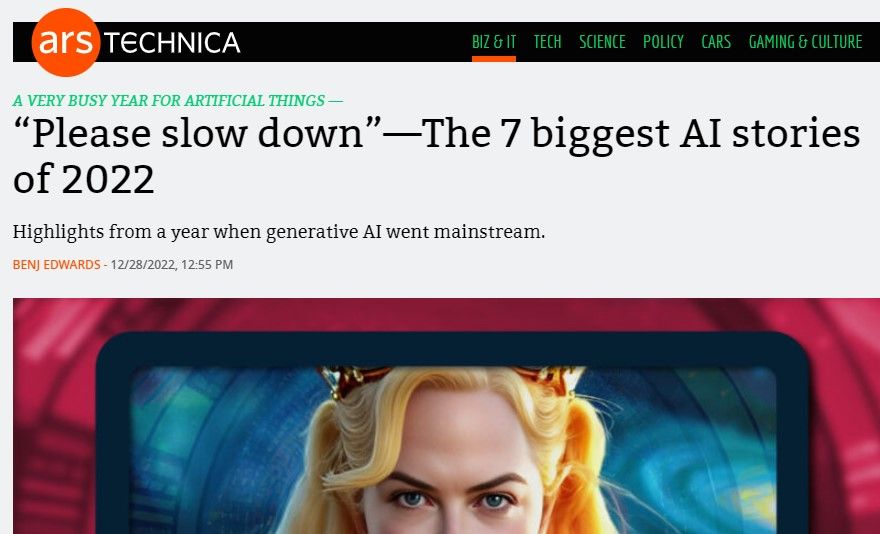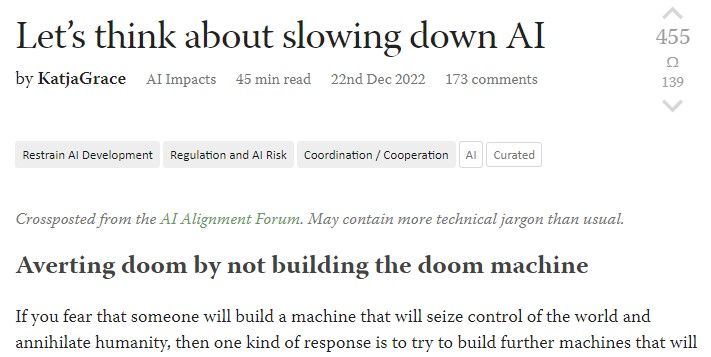
💡 Optimist's Edge: Why we should make the future come sooner
Do you think fast progress is dangerous? Use the seat belt test. What if the seat belt had been invented ten years earlier? If progress in vehicle safety had been faster, thousands of lives would have been saved.
Share this story!
📉 What people think
Be cautious! Slow down! Stop and think!
Right now, it is AI that should slow down, many people believe.

The argument is often that this new technology or knowledge will be dangerous, because we don't understand it. Or someone with ill intent does understand it and will use it against humanity.

Because of recent breakthroughs, AI is now the focus of attention. But throughout history, someone has warned about every new technology or new knowledge and wanted progress to stop or slow down.
More and more often, it is claimed that we are closer to extinction now than ever before. Because now we are powerful enough to destroy ourselves.
📈 Here are the facts
The seat belt test
An NHTSA study of lives saved by vehicle technologies found that, between 1960 and 2012, seat belts saved more lives than all other vehicle technologies combined, including airbags, energy-absorbing steering assemblies, and electronic stability control.
In 1959 the Volvo Amazon was the first car model that had the three-point seat belt as standard. Volvo made the patent available to other car manufacturers for free.

The seat belt test: Take a modern technology or modern knowledge and inject it somewhere in history. What if the three-point seat belt had been invented and made standard ten years earlier? If progress in vehicle safety would have been faster, that could have happened. The result would have been thousands of lives saved.
Or modern medicine during the Black Death? Dentistry (and anesthesia!) during the middle ages? Democracy a thousand years earlier? Human rights in the Roman Empire? The printing press in 500 BC?
Of course, giving Caligula a nuclear bomb wouldn't be great. But the risk of one technology progressing much faster than the general level of knowledge is low. Innovation depends on earlier innovation. There is a reason the Romans didn't have a Manhattan Project. If we increase the rate of innovation in one area, it will spill over and increase innovation in other areas as well.
The North or South Korea example

This photo from space of North and South Korea shows the difference between slow and fast progress.
In countries where they've stopped or slowed down progress people die younger, are unhappier and unhealthier than in countries with faster progress. The countries with the highest rate of innovation are where people live the longest, are healthiest and happiest.
AI and protein
Proteins are our body's workhorses. They convert food into energy that we can use, fight intruders, transport oxygen in the blood, and much more. Therefore, understanding proteins is essential for understanding our body and diseases and developing effective drugs.
Proteins are folded and to understand a protein you need to understand how. That could be done in a lab, but takes time and money.
In 2020 we revealed the structure of, in total, about 200,000 proteins.
Along came AI. DeepMind and a team at the University of Washington used AI to understand how a protein folds.
Now, just two years later, we know the structure of 200 million proteins!
Would we be better off without knowing that? That would have been the effect of slower progress on AI.

The intellectual framework
"It is often said that our civilization has entered an era of unprecedented risk from adverse side-effects of progress. It is said that for the first time in history, global civilization, and even our species, are at risk because of the speed of progress. But that is not so: that risk has been with us throughout our species’ existence and is less now than ever."
...
Every species whose members had the capacity for innovation, is now extinct, except ours, and genetic evidence shows that that was a close-run thing. All of them, and every past civilization that has fallen, could have been saved by faster innovation.
...
Nothing can eliminate danger, including from unforeseen side-effects of progress. Therefore caution is always necessary. The first flight of an airliner should not be carrying passengers. One should not trust the first predator 🐺 that seems friendly. But there is also danger from intangible enemies within, like taboos and pessimism. So one shouldn’t forgo the option to experiment with making use of the wolf. Unbeknownst to the people who first tried that, it would go on to create a new species 🦮 that could be of immense use – including guiding blind humans during the millennia before blindness is cured.
- David Deutsch in Optimism, Pessimism and Cynicism
💡 Optimist's Edge
💡 Slow progress is more dangerous than fast progress.
If we speed up progress we will solve more problems faster.

👇 How to get the Optimist's Edge
Read David Deutsch's book: The Beginning of Infinity.

Read David Deutsch's Optimism, Pessimism and Cynicism at Warp News:

Mathias Sundin
Editor-in-Chief
By becoming a premium supporter, you help in the creation and sharing of fact-based optimistic news all over the world.



